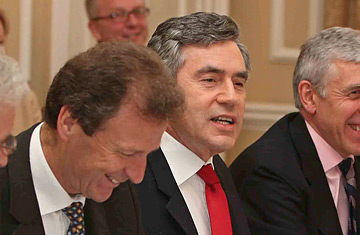
Gordon Brown presides over his first cabinet meeting, June 28, 2007
The photographers have been balancing on stepladders and defending their turf in uncertain weather for two days now, but still those encamped outside 10 Downing Street are cheerful. Not only are their editors hungry for images depicting the new government Gordon Brown promises to unveil in full in the next 24 hours, but the first and most prominent Cabinet appointment has provided them with a gag that, for the lensmen at least, has yet to wear thin. "Hello Darling!" they chorus raucously, as the new Chancellor of the Exchequer makes his way past the press pen.
Alistair Darling doesn't flinch but he is a brave man, willing to step into the biggest shoes in government. He inherits a robust economy with record employment, low inflation and a history of sustained growth, an achievement that's the proudest boast of his predecessor, now the Prime Minister, who will expect Darling to maintain the steady course set over New Labour's first decade in office.
Darling's appointment signals continuity but Brown's constant mantra of recent weeks has been change, a woolly promise to be different from his predecessor, which the politician again invoked as he stood poised to enter Downing Street for the first time as Prime Minister. The list of new ministers and departures in the style and presentation of the reshuffle have given the first hints of what form this change may take.
The faces around the Cabinet table won't look much different, despite Brown's vow to create a government drawing on talent outside the ranks of his own party. The outsiders will be consigned to more junior ministerial positions. Several Cabinet ministers are old hands, though sitting in different places; there are still more Scots (including Brown and Darling) and fewer women than their comparative proportions of the population, but in Jacqui Smith the U.K. now has its first female Home Secretary and, at 44, one of several youthful members of Team Gordon. Douglas Alexander, entrusted with International Development, and Ruth Kelly, now Transport Secretary, are both 39. James Purnell, the new Culture Secretary, and Ed Miliband, the Cabinet Office minister, are only 37.
Miliband's 41-year-old brother David was put under pressure by Brown's opponents inside Labour to stand against Brown for the party leadership. The Harry Potter lookalike, then Secretary of State for Environment, resisted those siren calls and will now be working spells over foreign policy as his reward. The new Foreign Secretary is unlikely to charm many neocons. Skeptical about the war in Iraq, David Miliband also protested in Cabinet last year at the British handling of the conflagration in Lebanon.
Working under him at the Foreign and Commonwealth Office as the Minister for Africa, Asia and the UN will be the newly ennobled Lord Malloch Brown, better known on the world stage as former U.N. Deputy Secretary-General Mark Malloch Brown. Well-connected in Washington, Malloch Brown also ruffled some American feathers. Last year John Bolton, then U.S. Ambassador to the U.N., said Malloch Brown was the author of "of the worst mistake by a senior U.N. official that I have seen." That comment followed a speech by Malloch Brown in which he criticized the U.S. government for permitting "too much unchecked U.N. bashing and stereotyping," adding that "the prevailing practice of seeking to use the U.N. almost by stealth as a diplomatic tool while failing to stand up for it against its domestic critics is simply not sustainable."
Malloch Brown's views have not mellowed. Last month, he gave a speech in London raising his concerns that Western interventionism had rebounded on humanitarian organizations which were now being seen as partial and political. Said he, "I have watched the work... get steadily more dangerous as it is seen as serving Western interests rather than universal values."
